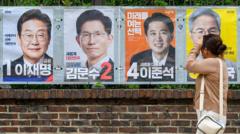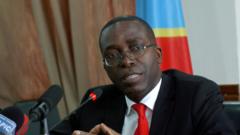Political unrest following a failed martial law declaration has shifted the dynamics of the presidential race, positioning Lee as a potential frontrunner despite lingering legal troubles.
**Political Upheaval Paves Lee Jae-myung’s Path to South Korea’s Presidency**

**Political Upheaval Paves Lee Jae-myung’s Path to South Korea’s Presidency**
Amid a backdrop of crisis, Lee Jae-myung rises as a leading contender in South Korea’s upcoming election.
Lee Jae-myung, once burdened by a string of scandals and legal challenges, has surged to the forefront of South Korea's political scene in the wake of a recent constitutional crisis. The upheaval began on December 3, 2024, when then-president Yoon Suk Yeol attempted to impose martial law, triggering mass protests and a political maelstrom. This tumultuous backdrop cleared a significant path for Lee, making him the Democratic Party’s candidate and the leading contender for the presidential election scheduled for June 3, 2025.
At 61, Lee brings a controversial and unconventional approach to South Korean politics, marked by his rags-to-riches story and staunch progressive ambitions. “Lee Jae-myung’s style tends to create strong opinions, both for and against him,” explains Dr. Lee Jun-han, a political scientist at Incheon National University. His rise from humble beginnings, where he faced personal and familial struggles, has resonated with working-class citizens disillusioned with the establishment but alienated many in the upper echelons of society.
Lee’s political journey began as a human rights lawyer before joining the Uri Party, the precursor to the current ruling Democratic Party of Korea. He gained popularity as the mayor of Seongnam and later as the governor of Gyeonggi Province, known for his universal welfare policies and decisive actions during the COVID-19 pandemic.
However, his climb has not been without pitfalls. Recent legal battles, stemming from accusations of corruption and delivering false statements during the 2021 presidential campaigns, loom large over his ambitions. In a notable incident from January 2024, Lee survived a severe assassination attempt while campaigning, underscoring the intensifying political polarization in South Korea.
Yoon’s failed bid to impose martial law inadvertently provided Lee with a platform; he quickly mobilized public protest against the order, helping to spark a legislative movement that culminated in Yoon’s impeachment by South Korea’s Constitutional Court. This sequence of events laid the groundwork for Lee to solidify his candidacy, as he announced his resignation as party leader to focus on the presidential race.
As Lee prepares for a potentially life-changing election, he faces a precarious balance of navigating his legal challenges while capitalizing on the political shifts that have brought him to the forefront. The forthcoming verdict on his legal issues remains crucial—should he secure a presidential win before facing a possible conviction, South Korea could witness unprecedented governance challenges ahead.


















